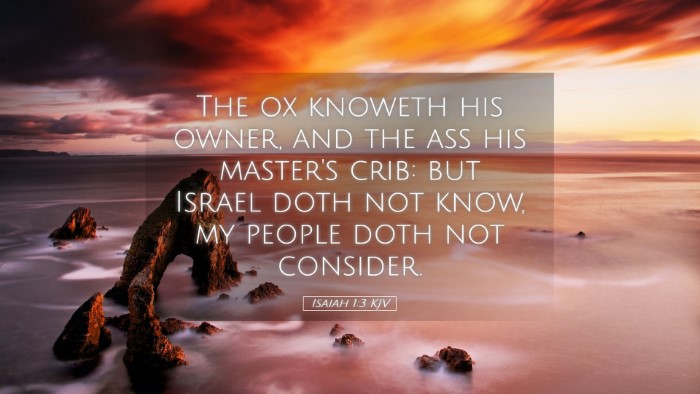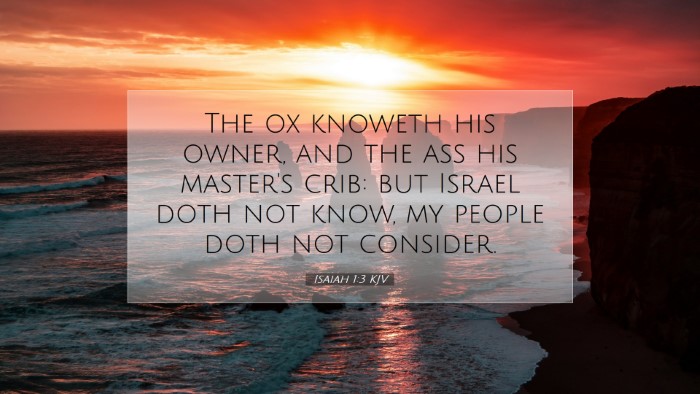Commentary on Isaiah 1:3
Isaiah 1:3: "The ox knows its owner, and the donkey its master's crib; but Israel does not know, my people do not understand."
Introduction
This verse serves as a striking introduction to the prophetic book of Isaiah, establishing a foundational theme of recognition and understanding between God and His people. The contrast drawn between animals and the nation of Israel reveals a deep spiritual indictment against the people of God.
Exegesis and Analysis
Matthew Henry offers profound insight into this verse, emphasizing the contrast between the instinctive recognition displayed by farming animals and the spiritual blindness exhibited by Israel. He notes that although oxen and donkeys possess no intellectual wisdom, they still recognize their owners and their designated places of care, underscoring a basic understanding of their relationships.
Albert Barnes expands this interpretation by highlighting the implications of Israel's failure to recognize and understand their Creator. He argues that the metaphorical use of animals illustrates a lamentable state of ignorance among God’s chosen people. Their inability to comprehend God’s ways and their rebellious attitude against divine instruction lead to their spiritual disarray.
Adam Clarke reinforces this theme by pointing out the significance of knowledge in the relationship between humans and the divine. Clarke explains that God expects His people not only to know Him but to engage with His purposes fully. His commentary illustrates that this lack of knowledge and understanding is not merely passive but leads to various sins and failures within the nation.
Theological Implications
The implications of this verse resonate deeply within various theological contexts:
- Covenant Relationship: This verse highlights the expectation of knowledge and recognition within the covenantal relationship between God and Israel. It raises questions about the responsibilities of the covenant community.
- The Nature of God’s Revelation: The Lord's desire for His people to understand Him emphasizes the active role of divine revelation. God does not conceal Himself; rather, He makes His ways known, expecting a responsive understanding from His followers.
- Human Responsibility: The verse assigns blame to the people for their ignorance. Their failure to acknowledge God’s authority speaks to human responsibility in nurturing spiritual understanding and awareness.
Application for Today
For modern readers, especially pastors, theologians, and students of the scripture, this verse serves as a reminder of the critical importance of spiritual awareness and knowledge. In a time where many may become spiritually apathetic, Isaiah 1:3 calls for introspection concerning our relationship with God.
The directive to recognize our Master necessitates continuous engagement with Scripture, prayer, and community. It challenges believers to ask whether they are spiritually attentive like the ox and donkey, or if they too have grown unaware of their Master's voice and presence. This prompts a deep examination of our spiritual state and our responsiveness to God's call.
Matthew Henry poignantly reflects this need in his writings, urging believers to actively seek understanding and not settle for complacency. As the church seeks to navigate contemporary challenges, this verse remains a pertinent reminder of our need for spiritual clarity and insight.
Conclusion
Isaiah 1:3 serves as a sobering reminder of the expectations placed upon God’s people concerning knowledge and understanding. The stark contrast between the instinctual awareness of animals and the spiritual ignorance of Israel illustrates a profound and timeless truth: we are called to know our God intimately and to understand His ways. By engaging with the insights of public domain commentaries like those of Matthew Henry, Albert Barnes, and Adam Clarke, modern scholars and believers can draw rich, applicable meanings from this ancient text.


